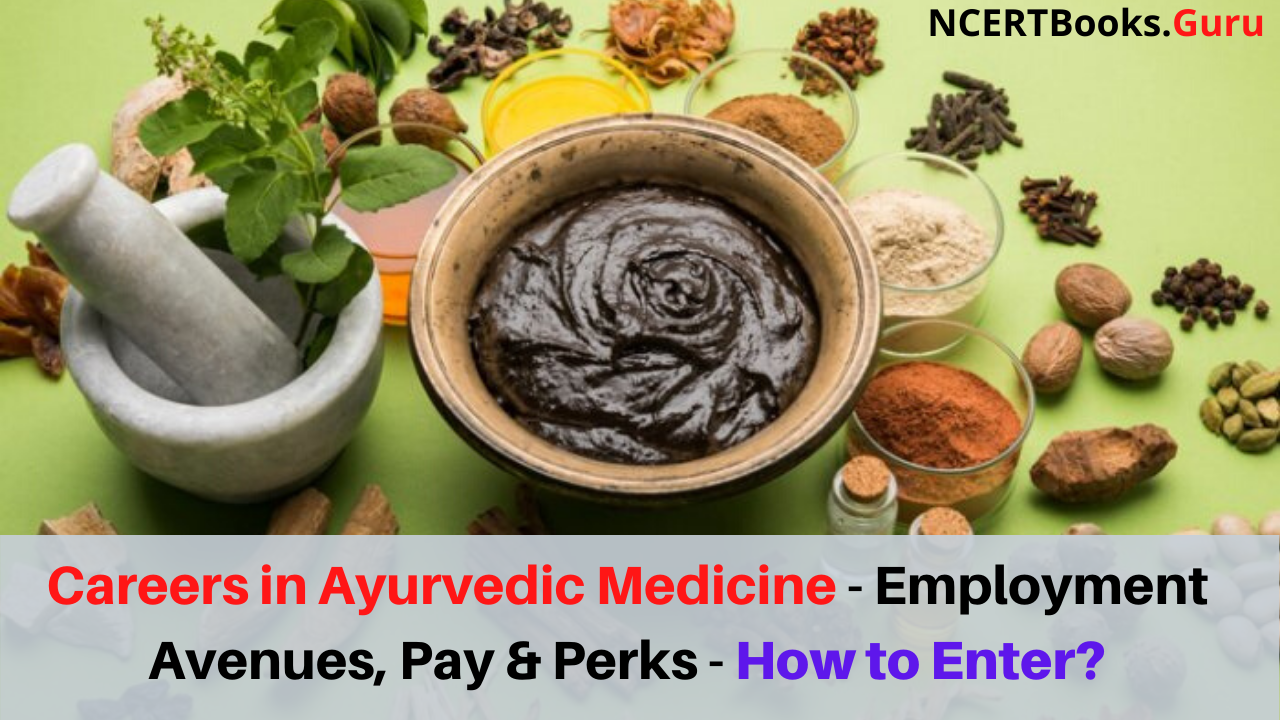Careers in Ayurvedic Medicine: Ayurveda is a combination of two Sanskrit words, ‘Ayur’ meaning life and ‘Veda’ meaning knowledge. Ayurveda originated around 600 BC in India. It is a life science which basically deals with the toxicology i.e. the study of the opposing effects of physical agents or chemicals on living organisms. Ayurveda is a combination of senses, mind, body and soul. It emphasizes that ‘Prevention is better than cure’.
Careers in Ayurvedic Medicine
Ayurveda explains that all matter is thought to be composed of five basic elements (panchamahabhutas) which possess the properties of earth, water, fire, wind, and space. These elements do not exist in isolated forms, but are always in a combination, in which one or more elements dominate.
Ayurvedic medicine, which originated in Vedic times, it has been in practice in India for the last five thousand years. It is rooted in India’s most cherished scriptures known as the Vedas. Ayurvedic Medicine is a comprehensive system of medicine combining natural therapies with a highly personalized approach to the treatment of disease.
There are several aspects to Ayurveda that are quite unique. It offers reference points for managing treatment decisions specific to each case. Ayurvedic theory is profoundly useful in analysing individual patient constitution and understanding variations in disease manifestation.
The branches of Ayurveda are Kayachikitsa (Internal Medicine), Bala chikitsa (Paediatrics), Graha chikitsa – Bhoota Vidya (Psychiatry), Urdhvanga chikitsa (Treatment of eyes, ears, nose, throat, and head), Shalya chikitsa (Surgery), Damstra chikitsa – Agada tantra (Toxicology),
Jara chikitsa-Rasayana (Gerentorology) and Vrishya chikitsa – vajikarana (Aphrodisiacs)
Special physicians who practise Ayurveda are called Vaidyas. They are known for promoting positive health, natural beauty, and long life.
One of the distinguished features of Ayurveda is that the ayurvedic medicines have no side effects. An Ayurvedic practitioner treats the patients with wide range of techniques including diet, herbal remedies, exercise, spiritual practices, and various healing modalities to bring a person into balance, etc. An Ayurvedic practitioner, diagnose the patient by feeling pulse rate, simple interrogation, checking blood pressure, etc.
The Central Council for Research in Ayurveda & Siddha (CCRAS)
Ministry of Health & Family Welfare, Govt, of India, Jawahar Lai Nehru Bhartiya Chikitsa Evam Homeopathy, Anushandhan Bhawan, No. 61-65, Institutional Area, Opp. ‘D’ Block, Janakpuri, New Delhi 110058, Ph:011-28525852/83/97/31/01
CCRAS, New Delhi, is an autonomous organization and an apex body in India for the formulation, co-ordination, development and promotion of research on scientific lines in Ayurveda and Siddha systems of medicine. More details about CCRAS are available on the www.ccras.nic.in.
Careers in Ayurvedic Medicine – How to enter?
Various courses are available in Ayurvedic colleges and Universities. At Undergraduate level 5Vi year BAMS is offered. Eligibility: (i) 12th Standard with Science (Physics, Chemistry, and Biology) and Sanskrit. Wherever provision and facilities for teaching Sanskrit as optional subject are not available at 12th Standard (Biology Science Group), the students with 12th Standard
(Biology Science Group) be admitted and Sanskrit be taught in main course. Or Uttar Madhyama of Sampumanand Sanskrit Vishwavidyalaya with Science and English. Or Any other equivalent qualification recognised by State Governments and State Education Boards concerned with the examination, (ii) The Pre-Ayurved Course of one- year duration in respect of Uttar Madhyama
Or Higher Secondary/P.U.C preferably with Sanskrit or an examination equivalent there to and Pre-Ayurved course of two years duration in respect of Purvamadhyama or S.S.L.C./ Matriculation preferably with Sanskrit or an examination equivalent thereto, however, will continue till 1990 if the State Government or University so desires.
Notification is generally issued any time between June to August.
Selection of BAMS is through the same All India Entrance Examination as for MBBS. In the case of private medical colleges entrance examinations are conducted by the institutes individually.
After BAMS course, you can go for Postgraduate specialisations in DravyaGuna, Kaya Chikitsa, Kaumar Bhritya, Pancha Karma, Rasa Shastra, and Bhaishajya Kalpana, Roga and Vikriti Vigyan, Samhita, Shalya Tantra, Sharira Kriya, Sharira Rachana, and Swastha Vritta. For Post graduate study, the period of study is three years. Ph.D. is also awarded in Ayurveda which is of two years duration.
Careers in Ayurvedic Medicine – Employment Avenues
The job of a Ayurvedic Professional is challenging keeping in view the wide range of incurable diseases newly emerging diseases and failure of other system of medicine specially allopathic System of Medicine. Employment opportunities are available in government and private Ayurvedic hospitals, as supervisors in Ayurvedic massage/health centres, industries engaged in Ayurvedic preparing Ayurvedic medicines, as Professor in Ayurvedic colleges or as a researcher. Moreover, a degree holder in BAMS, can open his/her own pharmacy.
Careers in Ayurvedic Medicine – Pay and Perks
In government Ayurveda hospitals starting salary scale is around Rs 8000 to 10000. But, as you gain experience you earn handsome amount. In private practice the remuneration depends totally on the effort you put in and your professional reputation. Dedicated and competent practitioners can earn more.
Careers in Ayurvedic Medicine – Education
Some of the Prominent institutions offering courses in Ayurveda are NTR University of Health Sciences, Vijaywada, Government Ayurvedic College, Guwahati, Banaras Hindu University, Institute of Medical Sciences, Varanasi, R.A. Poddar Mahavidyalaya, Mumbai, College of Ayurved and Research Centre, Pune, Ayurvedic and Unani Tibia College, New Delhi (Delhi University), Shri Dhanwantri Ayurvedic College, Chandigarh, Major S D Singh Ayurvedic Medical College & Hospital, Fatehgarh, Uttar Pradesh and other institutes imparting courses in Ayurveda are located in Andhra Pradesh, Assam, Bihar, Chandigarh, Chhattisgarh, Delhi, Haryana, Himachal Pradesh, Jammu & Kashmir, Jharkhand, Karnataka, Kerala, Madhya Pradesh, Maharashtra, Orissa, Punjab, Rajasthan, Tamil Nadu, Uttar Pradesh, Uttaranchal and West Bengal.
For a detail list of Institutes of Homeopathy in India: you may log on to the www.cchindia.com.
Related Articles:
SGT UNIVERSITY (Shree Guru Gobind Singh Tricentenary University)
Budhera, Gurugram-Badli Road,
Gurugram 122505 (Har.)
Ph: 0124-2278183/84/85, Toll-free: 18001025661, Email: [email protected] Faculty of Indian Medical System (Mob: 9278078011). SGT university.ac.in Bihar office: 9205277668, Guwahati office: 8527794488 offers: Bachelor of Ayurvedic Medicine & Surgery (NEET Qualified through Centralized Counseling). Admission is made through Computer Based Test CBT/Marks in Qualifying Exam. Selection is made on the basis of SGTUEE.


